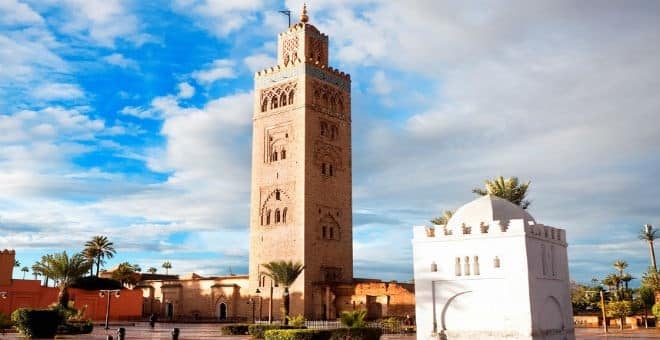Lalla Fatima Zohra al-Kush (peace be upon her) is a prominent figure in Sufism and among the renowned saints of Marrakesh. She became notorious for her piety, asceticism and goodness among the women of this blessed region, for she is the virtuous, the good, the pure Zohra al-Kush.
Born during the reign of al-Sadi, she lived from the late 14th century to the early 15th century. The house she was raised in was filled with science, righteousness, diligence, and generosity. It remains to this day a go-to spot for scholars and initiates alike.
A small dome was built in her memory in front of the centrally-located al-Kutubiyya mosque in the Moroccan city of Marrakesh. Her grave attracts visitors all year round who ask for her blessings and intercession with Allah.
Father’s influence
Lalla Zohra’s father, Sidi Abdullah bin Masoud, was a close companion of Abdul Karim al-Falah who himself was buried in the dome of al-Qadi Iyad, one of the Sabaâtu Rijal (Seven Saints of Marrakesh). He was famous for his generosity and virtue in the Marrakshi environment. As some stories say, he used to feed two thousand and two hundred people, and was known for his disciplined spiritual practice.
Her father’s zawiya was a branch of al-Jazoulya ash-Shadhiliya, started by Sidi Muhammad bin Sulayman al-Jazuli, may God be pleased with him. He faced the Portuguese and was captured in Azemmur before his assassination, may Allah have mercy on him.
Lalla Zohra followed in her father’s footsteps in giving and performing charity, for which she was famous. Myths and popular stories around her name grew and earned her the title of “The dove of Marrakesh.” From a young age, her father’s values and principles were instilled in her, as were those of the female saints of her time. She lived near the al-Kutubiyya mosque where she rests.
Sainthood
The sage and historian Ibn al-Muqt mentioned her in his book Eternal Happiness among all of the saints and mystics who became recognized around the area of al-Kutubiyya.
Ibn Al-Muqt expounded on her graces in his text: “And on the mention of Lalla Zohra, a man who was curious about a religious festival told me about what happened to him among what is known to be many of her graces, peace be upon her. He said that when women were gathered during the mawsim they usually organized in her zawiya near al-Kutubiyya. He wanted to look at the women but couldn’t find a way to get in unless he got dressed like a woman himself. He entered the zawiya, but as soon as he got in, he became blind. He couldn’t see anything anymore and was swiftly busted in broad daylight.”
He regained his eyesight after repentance and came to believe in Lalla Zohra’s sainthood. In his sixties, he was among the inhabitants of her neighborhood, may God forgive us and forgive him.
Strength of will
The Imam and historian al-Ifrani introduced her in his book Al-Safwah by saying: “Among them is the virtuous Lalla Zohra, daughter of the righteous saint Sidi Abdullah bin Masoud al-Kush. She was one of the firmly established people in gnosticism. With her evident sainthood, she learned from her father, and never got married. Her beauty was mentioned to the Sultan Zidan bin Mansur who showed interest in marrying her.” But like Lalla Rabia al-Adawiyya, the quintessential female saint figure in Sufism, she remained celibate.
With her father having died in battle, Lalla Zohra became an example of endurance and resistance for showing disobedience in the face of the Sultan. In a palace where the walls owed conformity and loyalty, she refused a marriage and proximity with the ruler. She preferred to be called a “slave” rather than be part of the sultan’s harem, choosing worship over a life in the sultan’s palace.
Before she was forgiven, Lalla Zohra was imprisoned unjustly and violently. Thereafter, she immersed in the world of Sufism and poetry. Filling her time with dhikr while organizing science circles for women and children, she taught jurisprudence, tafsir (Quranic exegesis) and the benefits of jihad an-Nafs (the war against one’s ego) to come into tawheed or union with Allah.
Morocco-based entrepreneur passionate about the historical and spiritual landmarks in his home city of Marrakesh, Ait Oufkir started the Facebook page Shadharata Murrakshia (“Marrakesh Nuggets”) to share his learnings with the world.



